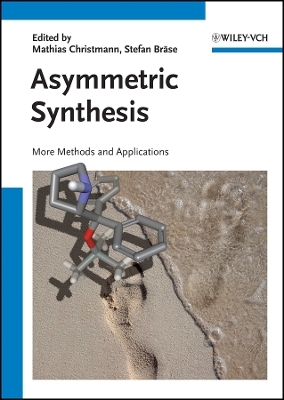
Asymmetric Synthesis II – More Methods and Applications
Wiley-VCH Verlag GmbH (Hersteller)
978-3-527-65223-5 (ISBN)
- Keine Verlagsinformationen verfügbar
- Artikel merken
this is the second edition with latest subjects and authors. While the aim of the first edition was mainly to honor the achievements of the pioneers in asymmetric syntheses, the aim of this new edition was bringing the current developments, especially from younger colleagues, to the attention of students. The format of the book remained unchanged, i.e. short conceptual overviews by young leaders in their field including a short biography of the authors. The growing multidisciplinary research within chemistry is reflected in the selection of topics including metal catalysis, organocatalysis, physical organic chemistry, analytical chemistry, and its applications in total synthesis, materials research and industry.
The prospective reader of this book is a graduate or undergraduate student of advanced organic chemistry as well as the industrial chemist
who wants to get a brief update on the current developments in the field.
Stefan Brase studied chemistry in Bangor, UK, Marseille, France, and Gottingen, Germany, where he gained his doctorate under Armin de Meijere in 1995. After post-doctoral appointments at Uppsala University, Sweden under J.-E. Backvall and The Scripps Research Institute, La Jolla, USA with K. C. Nicolaou, he began his research career at the RWTH Aachen with Dieter Enders in 1997, obtaining his lecturing qualification in 2001. He became a professor at the University of Bonn that same year and since 2003 he has been Full Professor at the Karlsruhe Institute of Technology. Professor Brase has more than 250 publications to his name and is a recipient of the ORCHEM award. His research interests include methods in drug discovery, combinatorial chemistry with a focus on the synthesis of biologically active compounds, total synthesis of natural products and nanotechnology. Mathias Christmann studied chemistry at the Technical University of Braunschweig and received a PhD from the Leibniz University of Hannover with Markus Kalesse. After postdoctoral research with Craig J. Forsyth at the University of Minnesota, USA, he joined the RWTH Aachen University as a Liebig Fellow of the Fonds der Chemischen Industrie, working towards his lecturing qualifi cation under Dieter Enders. In 2008, he was appointed Associate Professor at the Dortmund University of Technology, where he lectures in organic chemistry. Professor Christmann's research interests include organocatalysis, natural products synthesis and sustainable chemistry.
| Erscheint lt. Verlag | 14.1.2013 |
|---|---|
| Verlagsort | Weinheim |
| Sprache | englisch |
| Maße | 150 x 250 mm |
| Gewicht | 666 g |
| Themenwelt | Naturwissenschaften ► Chemie ► Organische Chemie |
| Naturwissenschaften ► Chemie ► Physikalische Chemie | |
| ISBN-10 | 3-527-65223-X / 352765223X |
| ISBN-13 | 978-3-527-65223-5 / 9783527652235 |
| Zustand | Neuware |
| Informationen gemäß Produktsicherheitsverordnung (GPSR) | |
| Haben Sie eine Frage zum Produkt? |